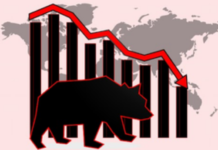NEW DELHI–The Indian economy grew 7.3 percent in the third quarter ended December 31, 2015 — down from the 7.7 percent expansion in the previous quarter, but marginally up over the 7.1 percent over the like period of last fiscal, official data showed on Monday. The Indian industry said it was looking to the upcoming union budget giving a positive direction to the economy.
As per official data on gross domestic product (GDP) released by the Central Statistics Office (CSO), the growth was pulled down by lower production in ‘agriculture, forestry and fishing’, ‘electricity, gas and water supply and other utility services’ and ‘financial, real estate and professional services’.
Inadequate rainfall this year meant agriculture and allied activities registered negative growth of (-)1 percent in the quarter — compared to a 2 percent growth in the previous quarter. Besides, there was a 6 percent growth in electricity, gas, water supply and other utility services — as against 7.5 percent growth in the second quarter.
Financial and professional services income in the September-December quarter grew at 9.9 percent — compared to 11.6 percent in the previous quarter.
The government’s mid-year economic review, released in December, lowered the economic growth forecast for the current fiscal to the 7-7.5 percent range, from the previously projected 8.1-8.5 percent, mainly because of lower agricultural output due to deficit rainfall.
India, last year, changed the way it calculated its gross domestic product under a new series, though the controversy over the changed methodology employed refuses to die down with economists even terming it obscure.
Changing the base year to 2011-12 from 2004-05 in January, the Central Statistics Office said India’s real GDP, that is adjusted for inflation, grew by seven percent in the first quarter of this fiscal, while for the first half of the current fiscal it grew overall at 7.2 percent.
Caution over the domestic economic growth data and a consolidation trend subdued Indian equities markets on Monday. This led to a barometer index of the Indian equity markets to end the day’s trade in the red — down 330 points.
In a report earlier this week, the Japanese financial services firm Nomura said India’s economic growth momentum is likely to slow down in the face of weak external conditions and sluggish investment demand.
Nomura said in a research note that there is a “downside risk” to its baseline forecast of 7.8 percent GDP growth in 2016, adding that a reading still above 100 on its Composite Leading Index “suggests a mid-cycle consolidation, rather than the start of a downturn” in India.
Reacting to the growth data, Federation of Indian Chambers of Commerce and Industry (FICCI) Secretary General A. Didar Singh said in a statement: “Some moderation has been reported in the other key sectors of the economy and we do hope to see a turn-around in near future.”
“We look forward to the union budget giving a positive direction to the economy. The focus should clearly be on introducing measures to further boost domestic investments and demand,” he added.
“Considering that agriculture’s gross value-added has turned negative, the sector continues to be key area of concern for the economy,” said Sunil Kanoria, president of the Associated Chambers of Commerce and Industry of India (Assocham).
“The government should also take proactive policy measures in the upcoming budget specifically focused on agriculture, infrastructure sector, steel, banking and financial sectors, among others, to revive the economy,” Kanoria said.
“Confederation of Indian Industry looks forward to a reform-centric budget which would put in place bold measures to remove supply bottlenecks and in turn spark a virtuous cycle of investment and growth,” CII Director General Chandrajit Banerjee said in a statement here.






